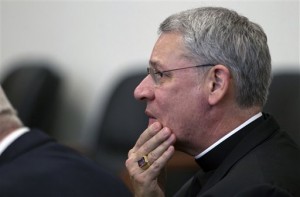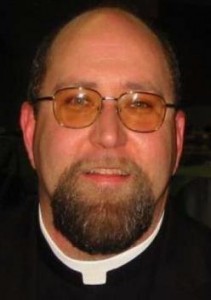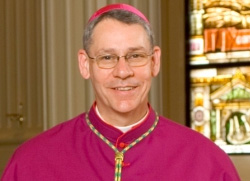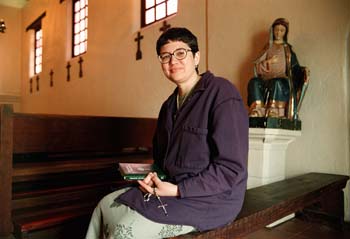Purgatory Begins for Bishop Finn
On September 6, 2012, Bishop Robert Finn of Kansas City-St. Joseph, Missouri Diocese was found guilty of failing to report evidence of sexual abuse by a priest in his diocese. 
Bishop Finn is one of four Opus Dei Bishops in the United States and a hardline conservative. At a Mass for Catholic school teachers and principals for the school year beginning August 2008, Finn–still coadjutor then–admonished the teachers to help their students resist the “culture of death” and the “age of relativism.” He said: “There are objective truths. There is right and wrong. Holy Mother Church is our mother who loves us and she knows best. Catholic schools must be places where these moral truths are taught without variation and without ambiguity for the sake of souls and salvation.”
After a brief bench trial, Judge John Torrence pronounced the bishop guilty on the charge of failing to report suspected child abuse, a misdemeanor in the state of Missouri, making him the first American bishop convicted of a criminal offense for mishandling sex abuse complaints. Judge Torrence sentenced Bishop Finn to two years probation. The maximum sentence he could have received was a year in jail.
Before sentencing, Bishop Finn, 59, offered a simple apology for his role in the case. “I truly regret and am sorry for the hurt these events caused,” he said.
The bishop knew the priest, Fr. Shawn Ratigan, pastor of St. Patrick’s Church in Kansas City, was in possession of graphic images of children’s genitalia, according to court testimony. However, he did not report the priest to the police.
Bishop Finn also said he did not report concerns about Fr. Ratigan to his diocesan review board, an advisory group the U.S. bishops’ charter mandates should be present in each diocese and should be used to evaluate allegations of abuse by priests.
After Father Ratigan was arrested, Bishop Finn met with his priests. Asked why Father Ratigan was not removed earlier, the bishop replied, according to the testimony, that he had wanted “to save Father Ratigan’s priesthood” and that he had understood that Father Ratigan’s problem was “only pornography.” 
Fr. Ratigan pleaded guilty in August 2012 to federal changes of producing and attempting to produce sexually graphic material of minor girls. These included hundreds of photos focused on the girls’ crotch areas. Most photos appeared to be of girls six to ten years old, One set of “staged” photos showed a little girl, two to three years old, lying down in bed. The girl was wearing only a diaper, but with each photo, the diaper was gradually removed to expose her genitals and buttocks. Another staged photo sequence showed a sleeping seven or eight year old girl with her legs repositioned. Investigators felt the photos were disturbing and sexual in nature.
The series of missteps that ended with Bishop Finn’s conviction and Fr. Ratigan’s arrest began with a May 2010 letter from Julie Hess, the principal of St. Patrick’s School, who expressed concern about the priest’s “perceived inappropriate behavior with children,” and reported that some in the parish feared he might be a “child molester.”
The principal noted in her letter that the school community’s response to the priest’s behavior reflected the extensive training that teachers, parents, volunteers and students had received in the wake of the clergy abuse crisis. Her letter included no specific allegations of sexual abuse, Rather, as she noted, the community’s concerns were prompted by the priest’s nonsexual boundary violations in his interactions with children. Fr. Ratigan encouraged children to sit on his lap and dig in his pockets for candy. He photographed them constantly, even when they weren’t doing anything particularly photogenic. The letter also noted his refusal to abide by the personal boundaries taught to and expected by all parish employees.
Msgr. Robert Murphy, Bishop Finn’s second-in-command, summarized the contents of the principal’s letter for Bishop Finn, who did not ask to see the letter, or speak with the principal. Msgr. Murphy was a key official in deciding how the diocese responds to allegations of priestly sexual abuse.
The diocese made no effort to notify the parents and families of St. Patrick’s parish or other parishes where Fr. Ratigan had been assigned. Bishop Finn advised that he felt that notifying parents at St. Patrick’s of the photos found on the laptop “would be like yelling fire in a crowded theater.”
He said and did nothing, and Fr. Ratigan continued to have contact with parish children and families.
This is the same man who upon becoming bishop, ordered the editor of the diocesan newspaper to immediately cease publicizing columns by Notre Dame theologian, Fr. Richard McBrien. Bishop Finn commented: “Everybody seems to make a big deal out of cancelling Fr. McBrien’s column. Quite honestly, it was fairly a no-brainer for me. Fr. McBrien likes to stir the pot. He approaches things with a certain skepticism and cynicism. You can get them in a lot of places, so go get it somewhere else. We need clear expressions of the meaning of faith, why we believe and how we can inspire each other.” Catholic publications, he said, must be “dependable in their fidelity.”
In mid-December 2010, Fr. Ratigan’s laptop was turned into diocesan officials after a computer technician found disturbing photos of children on the hard drive. After reviewing the photos, Ms. Julie Creech, the head of the diocesan’s technology department, told Msgr. Robert Murphy, vicar general for the Kansas City-St. Joseph diocese, to call the police.
Msgr. Murphy did not contact the authorities, but instead called a police captain who is a member of the diocese’s independent review board and described a single photo of a nude child that was no sexual in nature. Without reviewing the photo, the captain said he was advised that although such a picture might meet the definition of child pornography, it probably wouldn’t be investigated or prosecuted.
About a year and a half later, in May 2012, Msgr. Murphy told police Fr. Ratigan’s laptop had contained hundreds of photos. The stipulated facts also state that in testimony, Murphy reported the incident to police because he thought the diocese’s response to Fr. Ratigan was “moving along with no direction, and I thought, ‘I have to do something.'” ![Murphy[1]](https://nihilobstat.info/wp-content/uploads/2012/10/Murphy1.jpg)
According to the facts, Msgr. Murphy also testified Bishop Finn was “upset” upon hearing Msgr. Murphy had reported Fr. Ratigan. At the time, Msgr. told his sister, “I think I made a decision that will not make the bishop happy.”
When the news broke, local Catholics were outraged. The diocese organized “listening sessions” to manage the public reaction, and had participants engage in an exercise where they were instructed to write down a “hurt” and then write down a “hope.” Among the “hurts” written down by angry parents: “The images of my daughter’s private areas that the FBI showed me, they are forever burned into my brain…Shawn Ratigan was in my house, around my children in February, and I thought my children were completely SAFE!!”
Local Catholics took to the airwaves and web, too, setting up a Facebook page “Bishop Finn Must Go”, and commenting on blogs and newspapers. One woman named Ginger wrote: “I’ve followed this story since the beginning, and as a pro-lifer and a Catholic, I am mightily offended when people suggest poor Archbishop Finn is persecuted by the press because they are pro-aborts and he piously fought against stem cell initiatives. With friends such as Archbishop Finn, the pro-life movement needs no enemies. Men such as he who proclaim to be so pro-life out of one end of their mouths and then turn a blind eye to the sexual exploitation of children cause the bile to rise to my throat. No wonder the “liberal press” goes after these hypocrites with a vengeance. For pre-born life to matter so much when post-born children matter so little is sad indictment of the hierarchy. It shouldn’t come as a surprise that such despicable behavior on the part of ardent pro-life supporters casts shame upon us all.”
After his conviction, there were numerous calls for Bishop Finn to resign or be removed. Many people strongly argued that if Pope Benedict removed a bishop for supporting the ordination of women, he surely must do the same for a bishop convicted of protecting a sexual predator of little girls and toddlers.
I am of two minds on whether or not on whether Bishop Finn should be removed. On one hand, if we do believe terrible experiences can change people for the better, then Bishop Finn may end us as one of the vigilant bishops in protecting children and teens from clerical sexual abuse. He will certainly not want to go through this scrutiny, shame and public pillorying again. He will be forced to revisit, over and over again, why he made the choices he did and the hurt, pain and suffering they have caused, and diminished trust and faith in the institution and its leaders.
On the other hand, Bishop Finn is now totally neutralized as a conservative spokesman for the church. He will be reminded of Fr. Shawn Ratigan every time he opens his mouth. He will be reminded of how he chose protecting himself and a fellow conservative priest over safeguarding children and parish families. He will be reminded of who and what he put first. His crediblity as a spiritual shepherd is virtually nil. Very few will pay attention of who he insinuates they should vote for.
But maybe now that Bishop Finn is lying down in the “foul rag and bone shop of the heart” as the Irish poet, Yeats, described it, he will climb up a purified and changed man.
The words from his “Warriors for the Victory of Life” keynote address on April 18, 2009 can give Bishop Finn a simple caution and way to follow:
“Every day the choice is before us: right or wrong; good or bad; the blessing or the curse; life or death. Our whole life must be oriented toward choosing right, the good, the blessing, choosing life. If you and I fail to realize the meaning and finality behind our choices, and the intensity of the constant warfare that confronts us, it is likely that we will drop our guard, be easily and repeatedly deceived, and even lose the life of our eternal soul.”



